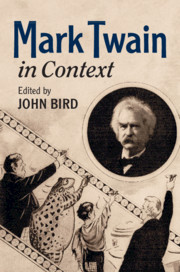Book contents
- Mark Twain in Context
- Mark Twain in Context
- Copyright page
- Contents
- Figures
- Contributors
- Preface
- Acknowledgments
- Chronology
- Abbreviations
- Part I Life
- Part II Literary Contexts
- Part III Historical and Cultural Contexts
- Chapter 15 Politics
- Chapter 16 Business and Economics
- Chapter 17 Religion
- Chapter 18 Science and Technology
- Chapter 19 Race and Ethnicity
- Chapter 20 Race and Ethnicity
- Chapter 21 Race and Ethnicity
- Chapter 22 Cosmopolitanism
- Chapter 23 Gender Issues
- Chapter 24 Gender Issues
- Chapter 25 History
- Chapter 26 Animals and Animal Rights
- Chapter 27 Nationalism and Anti-Imperialism
- Chapter 28 Philosophy
- Part IV Reception and Criticism
- Part V Historical, Creative, and Cultural Legacies
- Further Reading
- Index
- References
Chapter 20 - Race and Ethnicity
Native Americans
from Part III - Historical and Cultural Contexts
Published online by Cambridge University Press: 12 December 2019
- Mark Twain in Context
- Mark Twain in Context
- Copyright page
- Contents
- Figures
- Contributors
- Preface
- Acknowledgments
- Chronology
- Abbreviations
- Part I Life
- Part II Literary Contexts
- Part III Historical and Cultural Contexts
- Chapter 15 Politics
- Chapter 16 Business and Economics
- Chapter 17 Religion
- Chapter 18 Science and Technology
- Chapter 19 Race and Ethnicity
- Chapter 20 Race and Ethnicity
- Chapter 21 Race and Ethnicity
- Chapter 22 Cosmopolitanism
- Chapter 23 Gender Issues
- Chapter 24 Gender Issues
- Chapter 25 History
- Chapter 26 Animals and Animal Rights
- Chapter 27 Nationalism and Anti-Imperialism
- Chapter 28 Philosophy
- Part IV Reception and Criticism
- Part V Historical, Creative, and Cultural Legacies
- Further Reading
- Index
- References
Summary
Mark Twain’s attitudes toward Native Americans is complex and more troubled than his attitudes toward other racial and ethnic groups. His exposure to native tribes in Nevada and California during his days in the West shattered his romantic illusions about Indian life gained from his childhood reading of James Fenimore Cooper and other writers, and his writing in the time is virulently racist against Native Americans. His views may have softened somewhat later in his life, and there is evidence that he supported pro-Indian charities and efforts. But overall, his attitudes mirror those of white Americans at the time, which included wars against the Indians and removal to reservations.
- Type
- Chapter
- Information
- Mark Twain in Context , pp. 203 - 212Publisher: Cambridge University PressPrint publication year: 2020

